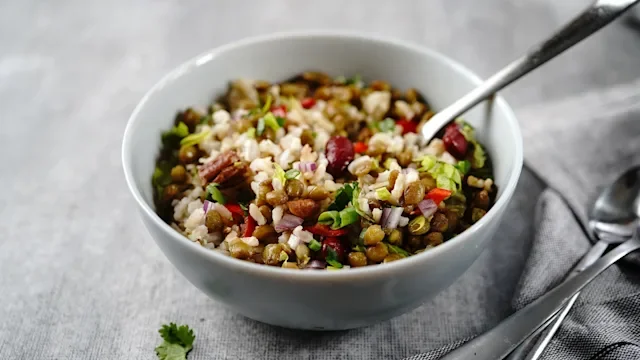Key takeaways:
Plant-based diets focus on plant foods — such as fruits, vegetables, whole grains, and legumes — and minimize food that comes from animals.
A plant-based diet emphasizes whole, minimally processed foods.
The health benefits of a plant-based diet include improved weight management, better heart health, and improved blood sugar management.
Plant-based diets are increasingly popular. But is this eating pattern healthy? Does it provide all the nutrients your body needs? And how do you actually follow a plant-based diet? Read on to learn more about a plant-based diet and its potential health benefits.
What is a plant-based diet?
A plant-based diet is an eating pattern that emphasizes nutrient-dense foods that come from plants. In a plant-based diet, the goal is to consume foods as close to their whole (unprocessed) and natural state as possible, while minimizing highly processed foods.
People following a plant-based diet may still consume small amounts of meat or other foods from animals, such as eggs or dairy. But animal products are consumed less frequently, and in smaller amounts. In this way, a plant-based diet is different from a vegan diet (which avoids all foods from animals) or vegetarian diet (which avoids meat). Another difference is that plant-based diets place an emphasis on the quality of the foods consumed.
What foods can you eat on a plant-based diet?
People following a plant-based diet have plenty of foods to choose from, since there are many types of foods that come from plants.
Foods that are central to a plant-based diet include:
Fruits and vegetables
Nuts and seeds, including nut and seed butters
Beans and legumes
All grains, with an emphasis on whole grains
Nutritious fats like olive, avocado, and coconut oils
Soy products like tofu and tempeh
Herbs and spices
Smaller amounts of animal products like eggs, dairy, and minimally processed meat, fish, or poultry
Note that many healthy eating patterns — including the Mediterranean diet and DASH diet — are examples of plant-based eating.
What are the health benefits of a plant-based diet?
Studies show that populations of people who eat a plant-based diet live longer than the average population. And a high proportion of people who live to be 100 years old eat a plant-based diet.
Let’s take a look at what science says about the various ways following a plant-based diet may help your health.
Does a plant-based diet help fight diabetes? There’s evidence that it can significantly improve blood sugar — and even small diet changes can make a difference.
Plant-based milks: Each plant-based milk has a different nutritional makeup, taste, and texture. Here’s how to choose the best one for you.
The best plant-based proteins: Eating many different plant proteins helps you get a wide variety of vitamins and minerals, plus all of the essential amino acids.
1. Weight management
Multiple studies have linked plant-based diets to a lower body mass index (BMI). A plant-based diet is also considered a healthy and effective choice for people whose goal is weight loss.
There are a few ways a plant-based diet may help weight management and weight loss:
Plant-based diets are naturally higher in fiber than other eating styles. Fiber helps with satiety (helping you feel full) and can help prevent overeating.
Plant-based diets tend to be low in saturated fat since they contain minimal dairy, meat, and eggs, which are often higher in fat.
Read more like this
Explore these related articles, suggested for readers like you.
2. Heart health
Research shows that plant-based diets may help decrease your risk of developing heart disease, and decrease your overall risk of dying from it. The fiber, antioxidants, and other plant compounds plentiful in plant foods may lower blood pressure and cholesterol levels. For these reasons, plant-based diets are a well-studied intervention for both preventing and managing cardiovascular disorders.
3. Blood sugar control
The high fiber, antioxidant, and magnesium in plant-based diets help to regulate blood sugar. It does this by helping your body respond better to insulin, the hormone that lowers your blood sugar. This is particularly important in the prevention and/or management of Type 2 diabetes. Research suggests people who follow a plant-based diet have a lower risk of developing diabetes than those who don’t follow a plant-based diet.
But note that proper blood sugar control is crucial whether you have diabetes or not. It’s important for your:
Energy levels
Overall metabolic health, which includes your cholesterol levels and body weight
4. Gut health
Plant-based diets are high in fiber, which benefits your gut health in several ways.
Fiber protects the mucus-layer that lines your gut and provides a home for your gut microbiome, the collection of microorganisms in your digestive tract.
Fiber also serves as fuel for the bacteria in your gut. Your gut bacteria digests the fiber you eat, turning it into molecules called short-chain fatty acids (SCFAs). These SCFAs can benefit your metabolism and immune system, among other things.
And following a plant-based diet may help promote a more diverse and stable gut microbiome. Research suggests that people on plant-based diets have higher counts of certain healthy gut bacteria compared to people who eat more meat. A healthy microbiome is a major factor in determining your overall health and risk of disease. In fact, research links an unhealthy microbiome to many health conditions like obesity, autism, and cancer.
Other benefits of a plant-based diet
Following a plant-based diet has other advantages that aren’t directly health-related.
Money savings
Plant-based diets are usually more wallet-friendly than diets that include animal products. Research estimates that people on plant-based diets save between 10% and 14% on their grocery bill. This is because meat and dairy foods usually cost more than plant-based foods like beans and whole grains. Of course, how much you spend depends on factors like where you shop and what, specifically, you buy.
Less environmental impact
Plant-based foods have a much smaller impact on the environment than animal foods. Following a plant-based diet:
Lowers greenhouse gas emissions caused by the food system
Reduces water usage
Reduces the amount of land used to produce meat and other animal products
These reductions can add up to help the health of our planet.
What are the risks of a plant-based diet?
A plant-based diet is healthy and safe for most adults.
There’s a common misconception that plant-based diets don’t provide enough protein. This isn’t true. Plant foods don’t always contain as much protein per volume as animal proteins. But several plant foods — like nuts, beans, soy, and whole grains — do provide protein. And the amounts can add up to meet the needs of most people.
One difference between plant-based protein and animal protein is that most plant proteins don’t provide all the essential amino acids, the building blocks to protein. But if you eat a variety of plant foods, your body should be able to get all of the amino acids and protein your body needs.
Some nutrients, including vitamin B12, calcium, and iron may be harder to get on a plant-based diet. People who avoid entire food groups — such as dairy, meat, or eggs — may benefit from consulting a healthcare professional to discuss supplements.
Who shouldn’t try a plant-based diet?
Check with your primary care provider before switching to a plant-based diet if you:
Have health conditions like kidney disease or diabetes
Are pregnant or nursing, and therefore have increased nutrient needs
Have or are at risk of having vitamin or mineral deficiencies
How to start a plant-based diet
It can be helpful to think of a plant-based diet as a lifestyle change rather than a diet. The word diet is often associated with restriction and calorie counting, and often implies a goal of weight loss. And diets are usually short-term.
But many of the health benefits from a plant-based diet happen over time. So, if you’re thinking of adopting a plant-based diet, do it in a way that’s sustainable for you. This makes you much more likely to reap its benefits over the long term.
Here are some tips for getting started with a plant-based diet:
Begin with small changes. Instead of changing your whole diet at once, try making just one or two plant-based meals per week. As you get used to these changes and learn more about what plant-based foods you like, you can modify additional meals.
Stock your pantry. Stock up on plant-based staples, such as beans, nuts and nut butters, and a variety of whole grains. Dried fruit, canned veggies, and frozen fruits and vegetables can also be healthful staples that don’t spoil as fast as their fresh counterparts.
Make animal proteins a “side.” Animal foods can be part of a plant-based diet, just in smaller amounts. So when you enjoy fish, poultry, or eggs, think of them as a side dish rather than the main dish. And fill the rest of your plate with plant foods like fruits, vegetables, and whole grains.
Get inspired by fun meal ideas. Poll friends and do some online research to get meal ideas for breakfast, lunch, and dinner. Oatmeal, whole grain and bean bowls, vegetarian burritos, and soups are just a few ideas. Get familiar with plant-based snack ideas, too.
Try to stick to whole foods. It’s not necessary to cut all processed foods from your diet. But try to focus more on whole (unprocessed) foods.
Let go of perfectionism. Don’t worry about following a plant-based diet rigidly. Making small changes to add more plant foods into your diet can still have a big impact on your health. And celebrating these positive changes can help give you motivation to keep going.
Frequently asked questions
Yes. Following a plant-based diet doesn’t necessarily mean that 100% of your foods have to come from plants. Chicken is a lean protein that can absolutely be consumed in small amounts as part of an overall plant-based diet.
Yes. Pasta is typically made from wheat or other grains, which come from plants. And there are plenty of plant-based toppings and mix-ins to choose from, like tomato sauce, plant-based meat, veggies, and herbs.
But note that white pasta contains simple carbohydrates. This can cause your blood sugar to spike. Whole-wheat pasta (or pasta made from other whole grains) contain complex carbohydrates — plus fiber — so they don’t lead to a spike in blood sugar.
Yes. Peanut butter is made from peanuts, which come from plants. Peanut butter can be an excellent source of plant-based protein and healthy fat.
Yes. Following a plant-based diet doesn’t necessarily mean that 100% of your foods have to come from plants. Chicken is a lean protein that can absolutely be consumed in small amounts as part of an overall plant-based diet.
Yes. Pasta is typically made from wheat or other grains, which come from plants. And there are plenty of plant-based toppings and mix-ins to choose from, like tomato sauce, plant-based meat, veggies, and herbs.
But note that white pasta contains simple carbohydrates. This can cause your blood sugar to spike. Whole-wheat pasta (or pasta made from other whole grains) contain complex carbohydrates — plus fiber — so they don’t lead to a spike in blood sugar.
Yes. Peanut butter is made from peanuts, which come from plants. Peanut butter can be an excellent source of plant-based protein and healthy fat.
The bottom line
A plant-based diet emphasizes whole, nutrient-rich plant foods, and minimizing animal products and processed foods. Following a plant-based diet can provide health benefits like better management of blood sugar, improved weight management, and lower cholesterol. To start following a plant-based diet, make small changes that are sustainable. A plant-based diet is safe for most healthy people. But it’s always a good idea to talk with a healthcare professional before making major changes to your diet.

Why trust our experts?



References
Clem, J., et al. (2021). A look at plant-based diets. Missouri Medicine.
Fadnes, L. T., et al. (2022). Estimating impact of food choices on life expectancy: A modeling study. PLoS Medicine.
Gibbs, J., et al. (2022). Plant-based dietary patterns for human and planetary health. Nutrients.
Green, C. M. (2021). Longevity blue zone centenarians: An expository paper. Inquiries Journal.
Jardine, M. A., et al. (2021). Perspective: Plant-based eating pattern for Type 2 diabetes prevention and treatment: Efficacy, mechanisms, and practical considerations. Advances in Nutrition.
McMacken, M., et al. (2017). A plant-based diet for the prevention and treatment of Type 2 diabetes. Journal of Geriatric Cardiology.
Myhrstad, S. C. W., et al. (2020). Dietary fiber, gut microbiota, and metabolic regulation—current status in human randomized trials. Nutrients.
Orlich, M. J., et al. (2013). Vegetarian dietary patterns and mortality in Adventist Health Study 2. JAMA Internal Medicine.
Pais, D. F., et al. (2022). The cost of healthier and more sustainable food choices: Do plant-based consumers spend more on food? Agriculture and Food Economics.
Ritter, S., et al. (2017). Chapter 9 monitoring and maintenance of brain glucose supply. Appetite and Food Intake. Central Control. 2nd Edition. CRC Press/Taylor & Francis.
Salehin, S., et al. (2023). Plant based diet and its effect on cardiovascular disease. International Journal of Environmental Research and Public Health.
The Johns Hopkins Patient Guide to Diabetes. (n.d.). Getting started on a plant-based diet.
Tomova, A., et al. (2019). The effects of vegetarian and vegan diets on gut microbiota. Frontiers in Nutrition.
Turner-McGrievey, G., et al. (2017). A plant-based diet for overweight and obesity prevention and treatment. Journal of Geriatric Cardiology.
Ursell, L. K., et al. (2012). Defining the human microbiome. Nutrition Reviews.


















